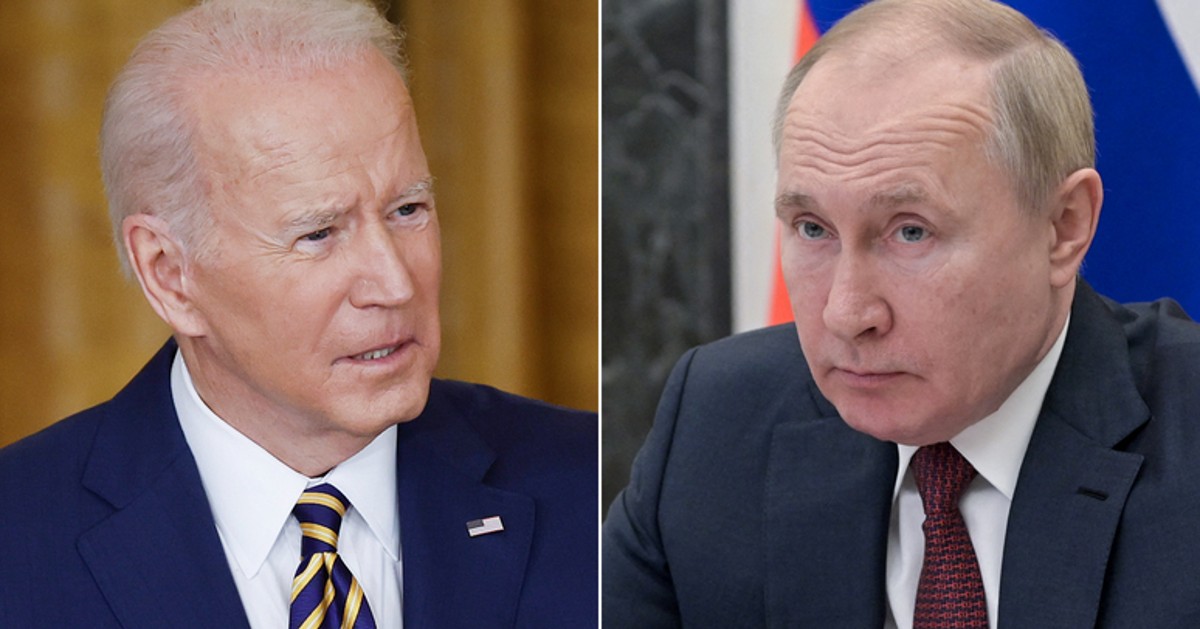OPINION: This article may contain commentary which reflects the author's opinion.
Russian President Vladimir Putin is increasingly deploying nuclear-armed military assets in and around Ukraine as well as near the borders of the United States as the first anniversary of his invasion draws near.
According to reports, Putin on Wednesday ordered nuclear-capable bombers aloft in a show of strength to the West while the country of Norway warned Russia has also deployed tactical nuclear weapons on warships in the Baltic Sea for the first time in three decades, since the end of the Cold War.
Prop-driven Tu-95MS “Bear” bombers accompanied by Su-30 fighter planes took off from Russia’s Eastern Military District and flew for around seven hours over the Bering Sea, which separates Alaska and the Russian far east. Since the invasion, Russian propagandists and various officials have repeatedly threatened the use of nukes as Russian soldiers continue dying by the tens of thousands, most notably at the hands of Ukrainian forces using Western arms.
The UK’s Daily Mail reported:
Russia’s language has escalated against Ukraine’s allies in recent months as they have pledged increasingly more powerful weapons to Kyiv’s on-going war effort.
The bombers took flight as the Norwegian Intelligence Service said in its annual report that ships from Russia’s Northern Fleet had started going to sea with nuclear weapons. This was common practice during the Cold War, but the report noted this was the first time the modern Russian Federation had done so.
“The key part of the nuclear potential is on the submarines and surface ships of the Northern Fleet,” said the Norwegian intelligence report. Tactical nukes are “a particularly serious threat in several operational scenarios in which NATO countries may be involved,” the report noted further.
In addition, Putin possesses many other military capabilities, including nuclear-armed submarines, anti-satellite weapons, and cyberwar capabilities, all of which would pose significant threats to Norway and its NATO allies.
NATO ministers met in Brussels, Belgium, on Wednesday to discuss the ongoing war and, in particular, Ukraine’s need for significant amounts of ammunition and other munitions that the West is finding increasingly difficult to supply. That said, U.S. Joint Chiefs of Staff Mark Milley proclaimed that Russia has already lost in Ukraine.
“Russia is now a global pariah and the world remains inspired by Ukrainian bravery and resilience. In short, Russia has lost; they’ve lost strategically, operationally and tactically,” he said, according to the Daily Mail.
Meanwhile, U.S. and British military intelligence agencies believe that Putin has committed anywhere between 80 and 97 percent of his army to the fight in Ukraine, where poorly trained conscripts are taking ground a few yards at a time but at a heavy cost.
The Week reports:
Russia’s forces are too spread out along the frontline “to punch through in a big offensive,” and “we’ve just seen an effort to advance, and that has come at a huge cost to the Russian army,” British Defense Minister Ben Wallace told BBC News on Wednesday. Russia is incurring “almost First World War levels of attrition, and with success rates of a matter of meters rather than kilometers.”
“We now estimate 97 percent of the Russian army, the whole Russian army, is in Ukraine,” Wallace added. The U.S. military estimated last week that Russia has dedicated about 80 percent of its ground force to the Ukraine invasion.
London’s International Institute for Strategic Studies estimated Wednesday that Russia has lost between 100,000 and 150,000 troops to death or injury in Ukraine, along with more than 2,000 tanks, including half the country’s modern tanks. Wallace cited reports that “a whole Russian brigade was effectively annihilated” in Moscow’s assault on Vuhledar, where Russia “lost over 1,000 people in two days.”
The report noted that Ukrainian forces are also taking heavy losses and that ground troops are blowing through ammo faster than Western allies can supply it. But that said, a senior Pentagon official told CNN that Russia’s new offensive is “likely more aspirational than realistic,” adding that it is not likely to be any more successful than past attempts.
A senior British military official said, nonetheless, “they do seem willing to send more troops into the meat grinder.”
